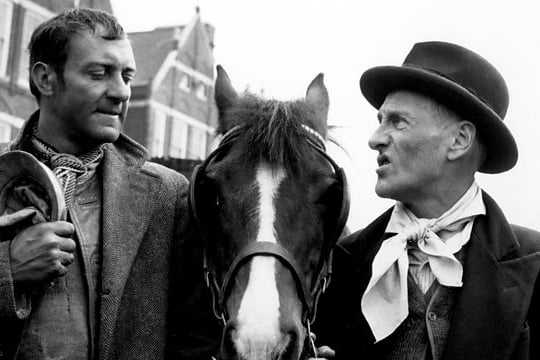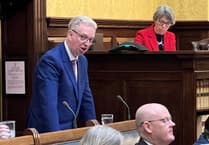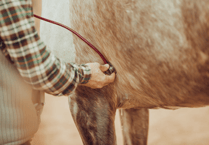I thought this week I would take a walk down memory lane to once again remember some of the comedy shows from days gone by.
1962 saw the introduction on BBC of Steptoe and Son, the family rag-and-bone business.
I remember similar characters around old Douglas, where you would hear a familiar call in your area of ‘rag 'n' bone’ or ‘fresh herrings’ - the latter, obviously, selling the delicacy of the king of the sea.
My dad had a large pot urn in which he would store his supply in salt to enjoy over the winter months.
Anyway, back to Wilfrid Brambell and Harry H. Corbett…Steptoe and Son was broadcast on BBC in black and white between 1962 and 1965, followed by a second run from 1970 to 1974 in colour.
There were also two film adaptations released in cinemas in 1972 and 1973.
The series focused on the inter-generational conflict of father and son. Albert Steptoe, described as ‘you dirty old man’ by his son, was an elderly rag-and-bone man, set in his grimy and grasping ways.
Harold, by contrast, was filled with social aspirations and pretensions.
The show contained elements of drama and tragedy, such as how Harold was continually prevented from achieving his ambitions - particularly, if I remember correctly, from a romantic perspective.
1968 saw a number of shows introduced, some of which, often via repeats, remain as popular today.
One such show is Dad’s Army, full of wonderful characters played by Arthur Lowe, John Le Mesurier, Clive Dunn, John Laurie, Ian Lavender, Arnold Ridley, Bill Pertwee, and many others.
It was originally broadcast on BBC 1 from July 31, 1968, to November 13, 1977.
It ran for nine series and 80 episodes in total.
A feature film was released in 1971, and a stage show and radio version were also produced.
The series regularly gained audiences of 18 million viewers and is still a favourite today.
Who remembers the often-used ‘You stupid boy!’ Or ‘Don’t panic’?
How about the quiet questioning of Captain Mainwaring by Sergeant Wilson: ‘Do you think that’s wise, sir?’ Or the dour Scottish character Private Frazer: ‘We’re doomed…doomed!’
Another from 1968 was Please Sir, set in the fictional Fenn Street Secondary Modern School, starring among others John Alderton, Deryck Guyler, Joan Sanderson, and Richard Davis.
Mollie Sugden, who lived in Port St Mary for some time and was very fond of our island particularly the Gaiety Theatre where she performed on a number of occasions, was also involved, although she is perhaps best known as Mrs Slocombe in the BBC series Are You Being Served?
Another favourite that first aired in 1968 is The Basil Brush Show...Boom boom!
Let’s move forward a year to 1969 for some new comedy titles that were launched, such as The Benny Hill Show.
At its peak, it was among the most-watched programs with an audience of 21 million viewers in 1971.
In 1972, Hill received a BAFTA TV award for Best Writer, among other nominations.
But in time, the audience numbers declined with changing attitudes toward some of the humour.
Another show to be launched in 1969 was Monty Python’s Flying Circus, starring Graham Chapman, John Cleese, Eric Idle, Terry Jones, Michael Palin, and Terry Gilliam.
There were a total of 45 episodes airing over four series from 1969 to 1974.
I have to admit that some of the humour went straight over my head, but some of the sketches were the best comedy ever, in my opinion.
‘The Norwegian Blue’ from the Dead Parrot Sketch, where the pet shop owner declared the parrot was only resting and tried to wake him up; the funny looks from those around the lumberjack as he declared how he liked to dress up in women's clothing, wear high heels, suspenders, and a bra; how about the ‘nudge, nudge’ sketch or the Ministry of Funny Walks?
I know you either love it or hate it, but the Vikings sailed across the mighty oceans powered by a good feed of spam or was it spam, bacon, spam, sausage, beans, spam, and spam?
Nobody expected a Spanish Inquisition to burst into the living room of the little old lady with their evil intentions, visualized by soft cushions and comfy chairs (Google it!).
I can’t repeat it here, but who recalls The Funniest Joke in the World or Argument Clinic?
One of my favourite, perhaps most irreverent, comedians, Dave Allen, started Dave Allen at Large in 1971.
I think the best comedians use everyday life and observation as the source of their humour, and in his series, which aired between 1971 and 1986, he tackled some subject matter that no other comedian at his level dared to touch.
He always signed off with ‘May your God go with you’.
The same year saw the launch of the very popular family game show The Generation Game, hosted between 1971 and 1977 by Bruce Forsyth, who was to return between 1990 and 1994. ’Didn’t he do well?’
And others, including Larry Grayson (’Shut that door’), Roy Castle and Jim Davidson.
It was screened over 362 episodes, including 59 specials.
Other Brucie catchphrases included ‘Good game, good game’ and, with audience participation, ‘Nice to see you, to see you nice!’
Who remembers all the potential prizes appearing across our screens for the winning contestant to remember? Wasn’t a cuddly toy one of the prizes?
One of my all-time favourites was The Good Life, which ran from April 1975 to June 1978 on BBC One, and fortunately, is among those which are repeated on the multiple channels available today.
I remember my mother renting a TV from Colebourn’s, a black-and-white set, which had pride of place in the corner of our front room and which had BBC 1, ITV, then BBC 2, then Channel 4, with no facility to record programs, but which was still the most important piece of furniture in the room - that was our good life at the time!
Back to the show: for me, it is just as relevant today with more people making lifestyle choices that better reflect a more sustainable future.
Tom and Barbara try to become totally self-sufficient in their suburban house in Surbiton.
Richard Briers and the lovely Felicity Kendal played the key roles opposite their next-door neighbours Margo and Jerry, played by Penelope Keith and Paul Eddington, whose habits and lifestyle conflicted sharply.
The conflict between the neighbours, balanced with an increasingly close friendship, created a recipe for comedy gold.
Outdoor filming took place in northern Greater London, in Northwood.
The grounds of the Goods's house were returned to their original state after the filming of each series, and all livestock were removed at the end of each day's filming.
The Good family turned the front and back gardens into allotments, growing soft fruit and vegetables.
They introduced chickens, pigs (Pinky and Perky), a goat (Geraldine), and a cockerel (Lenin).
They generated their own electricity with methane and attempted to make their own clothes.
They sold or bartered surplus crops for essentials they couldn’t make themselves and cut their monetary requirements to a minimum. Who remembers the Christmas hats?




-(1).jpeg?width=209&height=140&crop=209:145,smart&quality=75)